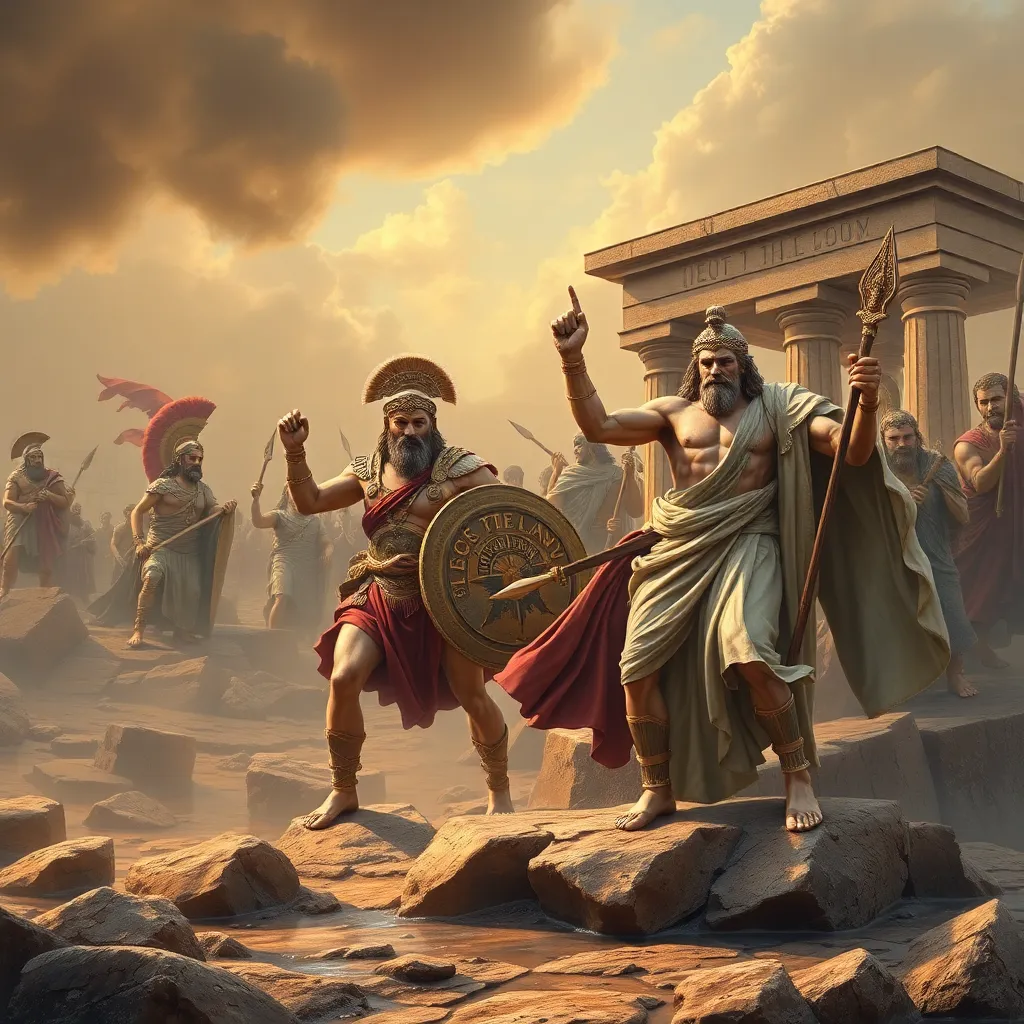The Iliad’s Depiction of Loyalty: The Trojan and Greek Sides
I. Introduction
“The Iliad,” attributed to the ancient Greek poet Homer, is a cornerstone of Western literature, renowned for its exploration of human emotions, war, and the complexities of life. Set during the Trojan War, the epic poem delves into themes of honor, glory, and the human condition, making it a timeless work that continues to resonate with readers today.
Among the many themes presented in “The Iliad,” loyalty stands out as a central motif that influences actions and decisions throughout the narrative. The concept of loyalty is depicted through the relationships between characters, both on the Greek side and the Trojan side, revealing the profound impact it has on their fates.
This article will explore the theme of loyalty as depicted in “The Iliad,” examining its various forms and implications for both the Greeks and the Trojans.
II. Defining Loyalty in “The Iliad”
Loyalty in “The Iliad” can be understood in the context of war, where allegiances can shift rapidly, and the consequences of betrayal can be dire. It manifests in various forms:
- Personal loyalty: The bonds between friends, such as Achilles and Patroclus.
- Familial loyalty: The duties of family members, seen in the relationships of Hector with his family.
- National loyalty: The commitment to one’s city or nation, particularly evident among the Trojans defending their homeland.
Honor and reputation play crucial roles in shaping these loyalties, as characters often act in ways that uphold or tarnish their standing among peers.
III. Loyalty Among the Greeks
The Greek side presents several key characters who exemplify loyalty, with their relationships showcasing the theme in various dimensions.
A. Key Greek characters exemplifying loyalty
- Achilles and Patroclus: Their deep bond illustrates personal loyalty; Achilles’ grief over Patroclus’ death propels him back into battle.
- Agamemnon: As the leader of the Greek forces, his decisions reflect complex dynamics of loyalty and leadership, often leading to conflict.
Loyalty among the Greeks affects their unity and internal conflict. The rift between Achilles and Agamemnon demonstrates how loyalty can be tested by personal grievances.
Betrayal is also a significant theme, as seen in Agamemnon’s quarrel with Achilles, which has dire consequences for the Greek forces.
IV. Loyalty Among the Trojans
The Trojans also display profound loyalty, particularly towards their homeland and each other.
A. Trojans’ dedication to their homeland
Hector, as the epitome of Trojan loyalty, stands as a warrior devoted to protecting his city and family. His commitment is evident in his willingness to face Achilles, despite the impending doom.
Family ties greatly influence Trojan loyalty, with characters like Andromache and Priam embodying the familial bonds that drive their actions.
B. The Trojans’ response to external threats
The Trojans demonstrate resilience in the face of external threats, rallying to defend their city against the Greek invaders. This collective loyalty bolsters Trojan morale.
V. The Role of Women in Loyalty
Women in “The Iliad” provide unique perspectives on loyalty, influencing the male characters and their decisions.
A. Women’s perspectives on loyalty in both camps
- Helen: Her role complicates loyalty, as she is torn between her Greek origins and her life in Troy.
- Andromache: Her loyalty to Hector highlights the personal stakes of war, as she fears for her husband’s life and the future of their family.
The loyalty of women profoundly impacts the fates of male characters, as their motivations often stem from the desire to protect loved ones or uphold family honor.
Furthermore, contrasting views on loyalty emerge between genders, with women often emphasizing personal and familial loyalty over the broader national allegiances that drive the male characters.
VI. Loyalty as a Double-Edged Sword
Loyalty, while often seen as a virtue, can also present significant challenges and consequences.
A. The benefits of loyalty in battle and personal relationships
Loyalty can strengthen bonds and foster unity among allies, as seen in the camaraderie among Greek warriors or the dedication of Trojans to defend Troy.
B. The pitfalls and tragic outcomes of misplaced loyalty
However, misplaced loyalty can lead to tragic outcomes, such as the deaths of key characters due to their unwavering commitments.
C. Examples of loyalty leading to downfall on both sides
Examples include Achilles’ loyalty to Patroclus leading to his own downfall in seeking revenge, and Hector’s loyalty to Troy ultimately resulting in his tragic demise.
VII. The Resolution of Loyalty Conflicts
As “The Iliad” progresses, the concept of loyalty evolves, particularly as characters face the futility of war.
A. The evolution of loyalty by the end of the epic
By the end of the epic, characters redefine their loyalties, often recognizing the tragic consequences of their earlier commitments.
B. Key moments that redefine loyalty for characters
For instance, Achilles’ reconciliation with Priam reveals a newfound understanding of loyalty that transcends personal vendettas.
C. The aftermath of loyalty in the context of war’s futility
The aftermath of the war brings to light the futility of loyalty tied to conflict, as the cost of allegiance results in great loss on both sides.
VIII. Conclusion
In summary, loyalty in “The Iliad” is a complex and multifaceted theme that shapes character motivations and actions. The epic illustrates how loyalty can unite individuals and communities but can also lead to tragic consequences.
Understanding the theme of loyalty provides a deeper insight into the human experience, reflecting the struggles that continue to resonate in contemporary contexts. Ultimately, “The Iliad” serves as a powerful reminder of the importance of loyalty in literature and life, prompting readers to reflect on their own allegiances and the complexities that accompany them.




